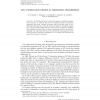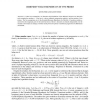56 search results - page 2 / 12 » On Rainbow Arithmetic Progressions |
80
Voted
COMBINATORICS
2006
14 years 11 months ago
2006
The set system of all arithmetic progressions on [n] is known to have a discrepancy of order n1/4. We investigate the discrepancy for the set system S3 n formed by all sums of thr...
MOC
2002
14 years 11 months ago
2002
Abstract. In 1967 the first set of 6 consecutive primes in arithmetic progression was found. In 1995 the first set of 7 consecutive primes in arithmetic progression was found. Betw...
102
Voted
EM
2010
14 years 6 months ago
2010
Under two assumptions, we determine the distribution of the difference between two functions each counting the numbers x that are in a given arithmetic progression modulo q and the...
98
Voted
CASC
2010
Springer
14 years 8 months ago
2010
Springer
Abstract. Residue systems present a well-known way to reduce computation cost for symbolic computation. However most residue systems are implemented for integers or polynomials. Th...
102
Voted
DAC
2007
ACM
16 years 19 days ago
2007
ACM
Despite the impressive progress of logic synthesis in the past decade, finding the best architecture for a given circuit still remains an open problem and largely unsolved. In mos...


